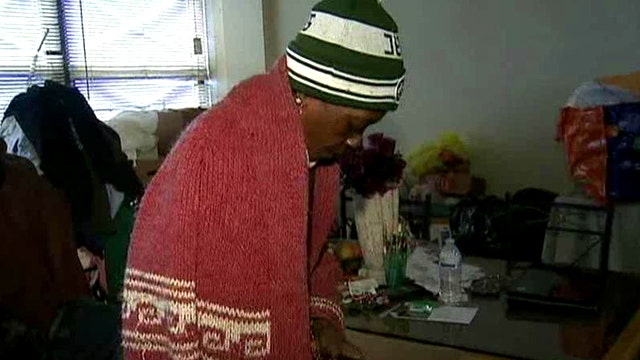Sandy victims shiver through Arctic blast with no heat
David Lee Miller reports from Staten Island
The brutal cold snap affecting much of the country is taking a devastating toll on victims of superstorm Sandy, many of whom are camped out in tent cities or living in homes without power, heat or running water.
Those unable to get proper lodging have hunkered down in their homes without the basic necessities of heat, electricity, or running water.
“Many families in Union Beach are using space heaters to warm upstairs,” said Jeanette Van Houten, a resident from the small New Jersey town that was among the hardest-hit communities. “There’s people with no heat, no electric, but they are staying in the house because it’s better than having to deal with FEMA and having to leave hotels every two weeks.
“There are families who have chosen to stay in their homes just to have some sort of normalcy,” she added.
The cold wave has brought single-digit temperatures to the Northeast, some 10 to 15 degrees below normal for the time of year.
Residents of the New Dorp Beach section of Staten Island have taken shelter in tents set up by aid workers with only small propane heaters, sleeping bags and blankets to stave off the bone-chilling cold, according to reports.
In the Queens neighborhood of Breezy Point, one of the most storm-ravaged areas of the region, residents lined up at the local recovery center this week to pick up donated ceramic space heaters. Many of the suffering residents in the five boroughs of New York City say their homes still are barely habitable, despite the city’s so-called Rapid Repairs program that was supposed to make their homes livable quickly.
According to the city, construction teams for the Rapid Repairs program have restored heat, hot water and power to more than 12,000 city residents, with work still to be completed in another 1,900 buildings.
Some 3,500 families are still living in hotels in New York and New Jersey, with FEMA picking up the tab. But the expense authorizations expire every two weeks and must be renewed, leaving families in a state of anxiety over where they will sleep at night.
Van Houten, whose house in Union Beach was destroyed by Sandy, has since stayed with relatives further down the coast in South Toms River. She said she feels that her and her family are fortunate.
“Things are far from better, but I’m one of the lucky ones,” she said.










































